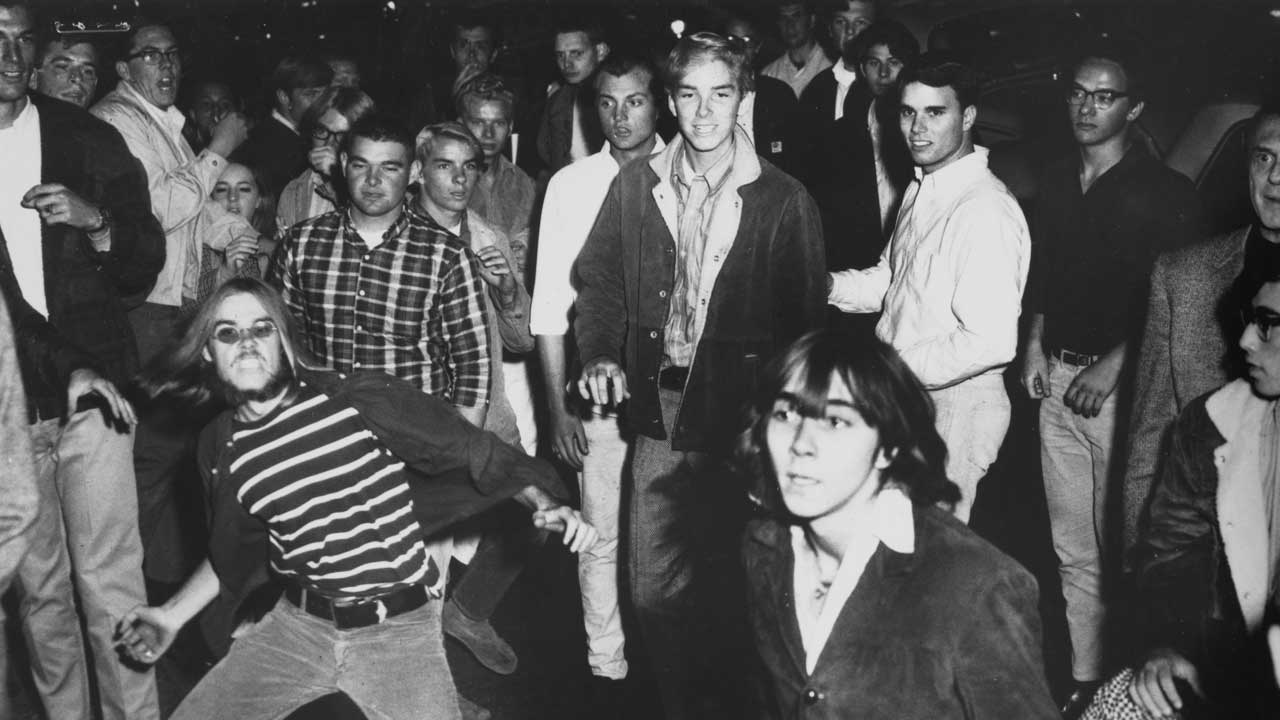"It was a very slow descent, but it was a descent - we were going in the wrong direction": How Skunk Anansie saved themselves from sickness and uncertain times
Skunk Anansie’s future hung in the balance, but a new album and the power of love changed everything
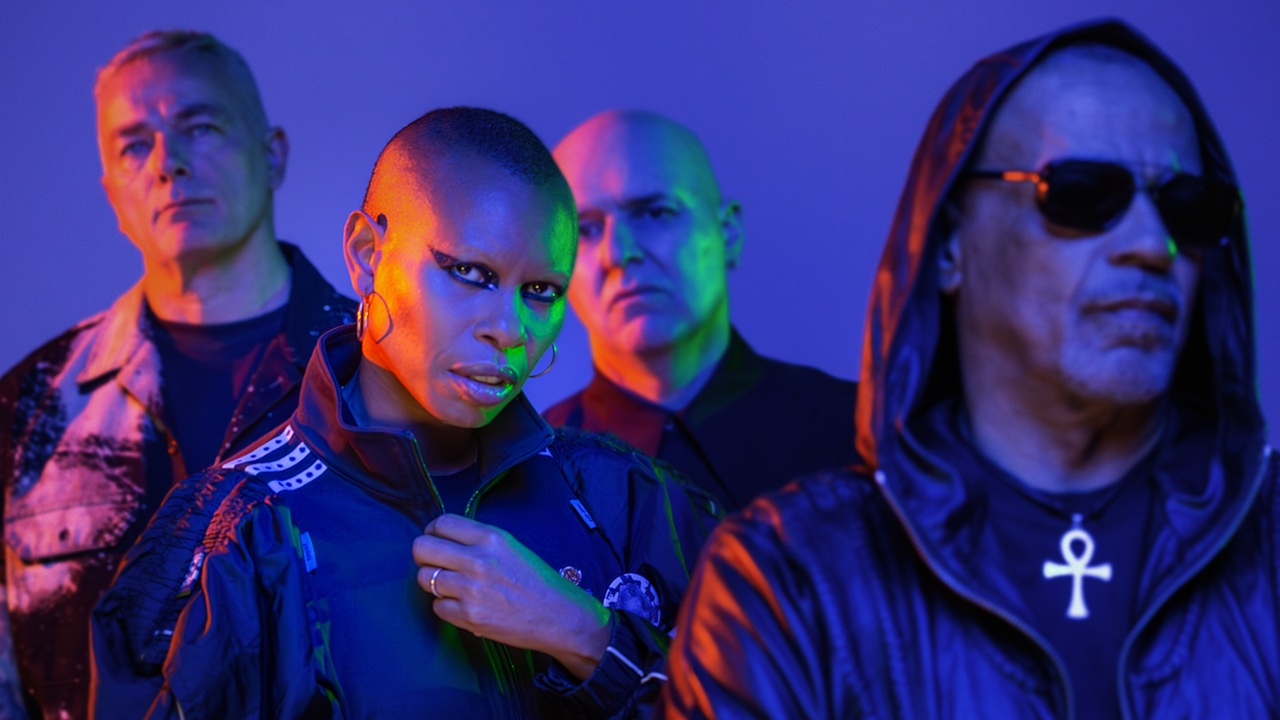
Select the newsletters you’d like to receive. Then, add your email to sign up.
You are now subscribed
Your newsletter sign-up was successful
Want to add more newsletters?

Every Friday
Louder
Louder’s weekly newsletter is jam-packed with the team’s personal highlights from the last seven days, including features, breaking news, reviews and tons of juicy exclusives from the world of alternative music.

Every Friday
Classic Rock
The Classic Rock newsletter is an essential read for the discerning rock fan. Every week we bring you the news, reviews and the very best features and interviews from our extensive archive. Written by rock fans for rock fans.

Every Friday
Metal Hammer
For the last four decades Metal Hammer has been the world’s greatest metal magazine. Created by metalheads for metalheads, ‘Hammer takes you behind the scenes, closer to the action, and nearer to the bands that you love the most.

Every Friday
Prog
The Prog newsletter brings you the very best of Prog Magazine and our website, every Friday. We'll deliver you the very latest news from the Prog universe, informative features and archive material from Prog’s impressive vault.
It’s Friday night at London’s Roundhouse. Skunk Anansie have just launched into raging 2022 polemic Piggy, and Skin is sailing across the crowd on a massive pig. A snarling, nose-ringed inflatable that would frighten the hell out of Pink Floyd’s porcine mascot, it’s a darkly sardonic steed for the woman we’re transfixed by. It’s hard not to smile when she does. An otherworldly but very likeable punk queen at 57, she soars effortlessly through operatic notes, honeyed warmth and hard-rocker grit, flanked on stage by three of her best friends, all of them striking powerhouses in their own right.
For all the Orwellian visual swings and political punches (far-right extremism, social media trolls, inequality…), a Skunk Anansie show is one of the most fun rock-geared nights out you can have. It’s also one of the most friendly. Mixing 90s megahits like Weak and Charlie Big Potato with fiery, fat-free new material (more on that shortly), they draw a far more diverse audience than most of their peers. There are men, women, teenagers, a few children with parents. At the front stands a guy with his hair in two enormous red spikes – old-school Camden punk chic at its least ironic – dancing with punters who look nothing like him.
“I saw him singing along to songs like Hedonism,” guitarist Ace tells us in the pub the next day. “You wouldn’t associate that with that kind of aggressive-looking crazy punk. But he’s singing a ballad and looking like he’s going to cry there.”
Even in the 90s, Skunk Anansie always had range in their political messaging. Boiling rage came with sing-your-heart-out choruses. Sharp, funny specificity was their secret weapon in anthems like Little Baby Swastikkka, where incisive imagery met the classic rock, punk, soul, jazz, pop and more of the band’s collective DNA.

But back to the Roundhouse, and the sound of a crash. Skin has fallen off the pig. Amazingly, she gets right back up – part rodeo champion, part high-fashion catwalk model. Soon after, changing gears again, she instigates an all-female moshpit, pogoing in the thick of it with her fans. The mood is giddy. It is political, but everyone here is having the best time, including the band.
“It’s fun to play those songs,” bassist Cass Lewis offers. “We have fun playing Swastikkka and Yes It’s Fucking Political. Those are our banging songs. We’re not playing songs like Rage Against The Machine. Our anger is mixed up with all the fun that we have when we play together.”
Skunk Anansie haven’t been idle in the nine years since their last album, but nor have they been the force of freshness they used to be. Between ‘greatest hits’ shows, 25th-anniversary activity, Skin’s appearance on The Masked Singer and a few singles, they began to feel rooted in their past. Behind the scenes, the retirement of their longtime manager shone a light on questions about their future – the truth about what they were in danger of becoming.
Sign up below to get the latest from Classic Rock, plus exclusive special offers, direct to your inbox!
“It was a very slow descent, but it was a descent,” Skin reflects. “We were going in the wrong direction. I felt that for a few years.”
“We needed to reinvent,” drummer Mark Richardson agrees. “We needed to go somewhere different. We stood on top of the cliff, held hands and jumped into the clouds.”
Recorded in Los Angeles with maverick producer/TV On The Radio mastermind David Sitek, new album The Painful Truth is the result of that leap. A taught, fearless selection of bangers, ballads and incisive statements, it’s the sound of a band fully invested in pushing themselves. The music of a group who’ve faced huge life changes, ever-shifting industry sands and a close brush with death. Proper songs at a career juncture when so many forget how to write them.
“I wanted to make this kind of album for a very long time,” Skin says, “and for one reason or another reason things just didn’t happen the way we wanted it to. And then this was a chance.”
The next afternoon – a few hours ahead of their second sold-out night at the Roundhouse – we’re in Skunk Anansie’s dressing room. Generations of the Skunk family gathered here last night over gin, babies and post-gig highs. All four in the band are parents. Cass recently became a grandfather. Now, as Skin extends a hand, we can hear Mark’s teething seven-month-old with his wife in the next room. At one point Cass pops in to check on plans for Ace’s birthday tomorrow. There’s comfort between them, undercut by the emotional whirlwinds of parenthood and touring life. You can see it in the balance they strike on stage between politics and party-friendly warmth.
“I think people suck in the message better if you surround it with a little touch of cheekiness and a sense of humour,” Skin muses, all eye contact and enunciation. “Yes, you can write songs that say ‘fascism is bad! We don’t like fascism, boo boo booooo!’ But it’s so clichéd. So, for us, it’s better to try to be clever about it, because then it gets to people in a different way. And at the end of the day, people have come to a fucking gig, right? They want to enjoy themselves. They don’t mind a bit of messaging as long as it’s not every song all the way through.”
Cosy but fashion-alert in voluminous denim and a woolly hat, with dyed blond eyebrows and a black manicure, Skin has the laser focus of someone who’s been misinterpreted all her life – and now knows precisely what she wants to say. Years of experience across the full media spectrum have put an eloquent intensity in her answers. No one fucks with her when she dives into crowds. But there’s a softness to her, too. She can be very funny. She breaks into a smile on certain subjects (Nina Simone, her daughter’s favourite Disney characters, the humour in her lyrics on The Painful Truth). She pokes fun lovingly at her bandmates, as they do with her, but you sense that they’d all take a bullet for one another.
“We’re lucky, because these are genuinely three of the nicest men I’ve known on the planet,” she says, nodding to Mark as he joins us – all inked gym-honed arms, spiked silver hair, and a gentle manner that belies his thunderous performance behind the kit. “You know, I’ve had these guys be around the gayest things on the planet, and it’s just like, no vibes or whatever. But they’re genuinely very good people, and they’re really different from each other.”
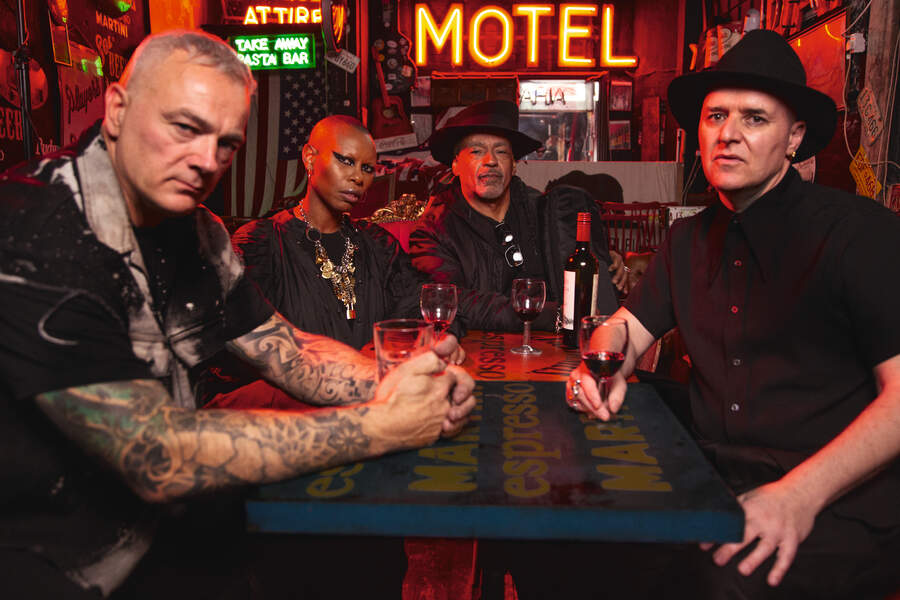
Up the road at the Pembroke Castle pub, the other half of Skunk Anansie enjoy the sun over gin and tonic (Ace) and nachos with a pint for a late breakfast (Cass). They’re easy, friendly company. Ace’s formative years were spent in the bars around Camden Market, so this is very much home turf.
“And when Skunk first got going, we all went to Camden to buy clothes,” he recalls. “Slightly different story for Skin now, her clothes don’t come from Camden, they all come from Gucci to Camden, or whatever.”
North London lifers who still live locally, Ace and Cass grew up in the same record shop in Queensway. Cass (born Richard Lewis) bought his first album there: Bill Haley & The Comets’ Rock Around The Clock, not what you might expect from the slinky Funkadelic grooviness of his bass lines today. “And I bought Elvis Presley,” he adds, “and my first pop album was David Essex.”
Imbued with a brightened disposition following a close call with cancer, Cass is the most naturally sociable of the group. When Skin needed a wingman to visit the Jean-Paul Gaultier offices recently (she’s had a long relationship with the French fashion house), she took him.
“I’m like: ‘I’m taking Cass, because he’ll just charm all the girls,’” she says later. “And that’s exactly what happened. Because I can be a bit shy in those kinds of situations, [with] posh things and posh people.”
She pauses with a knowing grin. “But then he made me go with him to Chanel to get a present for his girlfriend. Because I know how to do that, I know which handbag, I’m like: ‘Yeah, don’t get your money out here…’”

For Ace (Martin Kent on his passport), it was all about punk in the beginning. The guitarist picked up albums by The Stranglers and The Dickies, until he discovered Black Sabbath and traded all his punk records for a Sabbath double compilation. As an adult, he’s translated that thirst for newness into different roles – teaching, writing columns for Guitarist magazine and starting a music school in Italy. Currently head of industry partnerships and business development at London’s ICMP (Institute Of Contemporary Music Performance), he’s very much the ‘business head’ in Skunk Anansie. It’s a role he wears naturally. It’s easy to picture him working with young people.
“I love being surrounded by young, vibrant, creative individuals,” he enthuses, beaming. “There’s such a diverse mix of people at those places, it’s amazing. There’s energy there all the time, creative energy, which is more so than you get off the older, jaded bands.”
Experiences like these (Mark also has a teaching background, and Skin mentors students at NYU’s Clive Davis Institute) served them well when it came to recording The Painful Truth with David Sitek. Known chiefly for his role in alt.rockers TV On The Radio – he also has production and remix credits for Nine Inch Nails, Weezer, Steven Wilson and lots more – Sitek was also a big Skunk Anansie fan. During sessions at his studio in LA, he hauled them firmly outside their comfort zone. Out went their riff-based roots, in favour of a lyric-first approach, with ample space for experiments and left-field touches. Strong choruses were key. They all agree it was exactly what they needed.
“It was like breathing new life into us,” Cass remembers, “just having someone with a completely different approach, who deconstructed what we normally do.”
“I call it simplistic madness,” Ace reasons. “Simplistic in the fact that it’s really basic in certain ways, and it’s all analogue sounds. But it’s complete madness. When you listen to An Artist Is An Artist, it’s like: ‘What is that arrangement? It’s fucking insane.’ And then Lost and Found, that’s a really bizarre arrangement, same with Animal. But we did what felt good, not questioning it. So when I came to learn the record, I was like: ‘This is quite weird…’”
And yet for all its curveballs and fewer guitars, The Painful Truth rocks hard. Solos are all the more powerful for their sparing deployment. Groove and melody are the core drivers throughout, lending a sensual heartbeat to the whole record. It doesn’t sound like a band doubting their future, despite notions to the contrary after their longtime manager retired. When that happened, Skin suggests, there were assumptions within their camp. Namely that Skunk Anansie would do a big farewell arena tour, make a ton of cash and call it a day.
“It was almost decided for us,” she says. “But it’s kind of like: ‘Well, no one actually asked us!’ And when the four of us actually sat down and asked ourselves, we were like: ‘Absolutely not. Let’s make a new album.’”
United in their resolve, Skunk Anansie knew where they needed to go. There was a farmhouse in Devon that became available. Beautiful countryside. Sheep for neighbours. No phone signal. No distractions. They packed their bags and headed there. Over the course of four sessions in this remote idyll, they wrote songs that became the nucleus of The Painful Truth. They talked frankly about their lives. Cass walked his dog in the fields. Skin cooked everyone fry-ups for breakfast. For the singer it was a welcome echo of her newfound domestic bliss in America; she and her wife have a house in upstate New York, with a lake where their daughter learned to swim.
Right away, An Artist Is An Artist, a razor-sharp attack on the neanderthal lows of social media comments, was the song to beat. Now the album’s angular but fiercely hooky opening track, complete with an unprecedented avant-jazz sax solo, it set the bar for this new Skunk Anansie era.
“It’s a statement of intent, isn’t it?” says Mark. “Like: ‘This album is different.’ I mean, bearing in mind [that] we’ve been a band of three decades that’s consistently taken the piss out of saxophone and hated on it a lot, and then on Artist it just sounds so perfect.”
“And that was showing off,” Skin acknowledges, of the song’s brilliant, climactic lyrical assault. “Like, how ridiculous can I get? It’s the middle eight. It’s the fucking shining part of the song. I’ve got to be a clever bitch, have some word play in there.”
Taken to new, biting extremes in LA with Sitek, firecracker moments like this sit naturally alongside contrasting moods elsewhere. From the sultry R&B of Fell In Love to bittersweet party anthem Cheers and the bass-heavy thump of Animal, it speaks on a universal level even where it’s rooted in Skin’s own experience.
“As long as you’re not trying to encompass the ‘sentiment of a generation’ or some bullshit,” she says. “Just be real. I mean, I fully expect to get in trouble for some of these lyrics.”
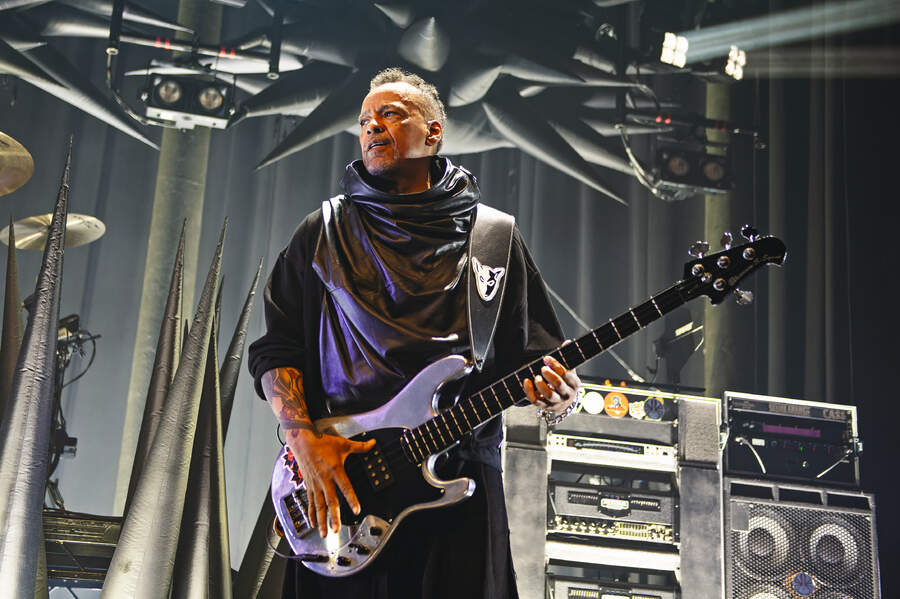
One potent example of this is the downbeat, smoky ballad Shame. There are echoes of her upbringing there, which involved moving between Air Force bases, living above her grandfather’s club in Brixton, struggling to find her place. Personal ghosts that, without the backing of her bandmates, would have been harder to face.
“'I got the love from my mother, the pain from my dad, the blame from my brother, shame I got it bad’,” she recites, a stillness coming over her. “I said to the guys: ‘I’ve got to change this bit, I’m just gonna get too much trouble.” And they were like: ‘Do what you gotta do, girl.’”
“It’s your truth, isn’t it?” Mark shrugs simply. “But it changed the way we wrote entirely, because before that we’d had all these riffs and all this stuff, and we were like: “When are you gonna do lyrics, Skinny?!’ [Her actual nickname, changed to Skin because it sounded cooler.] And it’s just too overwhelming. It’s too much. Where’s the inspiration? And what we’ve learned is we need to make space for that to happen [first].”
Watching him and Skin, ostensibly two very different people, there’s a quiet but companionable understanding between them. The fitness-focused half of the band, given their respective roles. He’s a gym and HIIT guy, she does yoga and weight training. He’s been sober for 21 years. She’s acutely conscious of sustaining her performance powers long-term.
“I saw Diana Ross twice last year, and she’s fucking shit,” Skin exclaims. “She looks fantastic and it’s Diana Ross, but the voice is gone, and she makes zero effort to sing anything properly. But I saw Dolly Parton – perfect. I want to be like that. I want to be like Tom Jones and still be able to sing at eighty.”
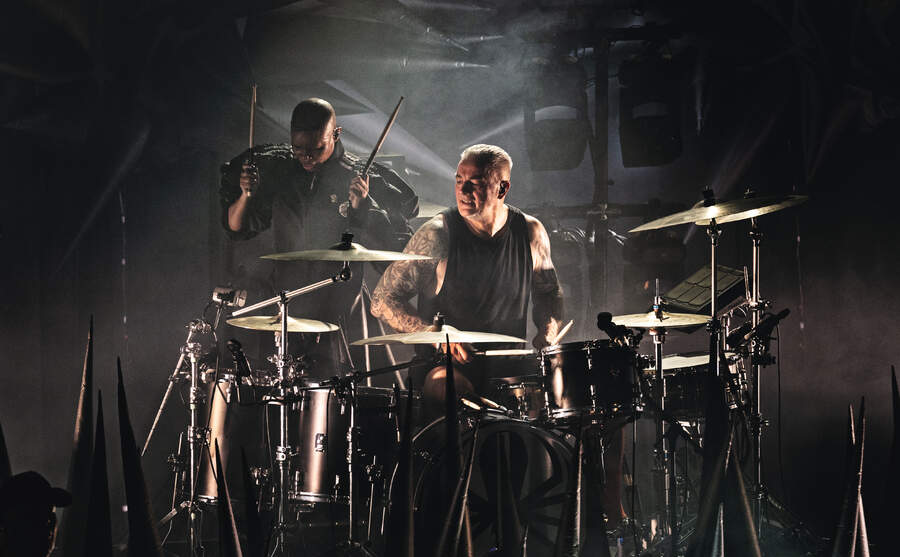
For the whole band, that awareness of our mortality shot up following Cass’s stage four cancer diagnosis, while The Painful Truth was in the works. Punishing stretches of chemotherapy ensued. For a while the line between life and death looked thin. Then one day Skin’s daughter told her mother:
“Uncle Cass isn’t sick any more”. Incredibly, it turned out to be true. He declined the option of stem-cell treatment and instead went to LA to finish the record with the band.
“I feel really strong, I feel fantastic,” he tells us in the pub today. “Even when I went to LA to finish the album, you could see my skin, it’s all blotchy and patchy. But the first time I caught a cold after being sick was on this tour! And it was beautiful, because one of the things that helped bring me through was the band, you know. Ace used to come and see me quite a lot, and he has no idea what it meant to me.”
He breaks off. The shadow of that time hangs. There’s nothing anyone can say for a moment, as they look at each other across the table.
“It’s love,” Ace says, wiping his own eyes. “It’s love.” There’s a pause. “I drove my car into the fucking kerb on the way back from your place, I was so sad.” They both laugh at that. “But no, it’s a place of love, isn’t it? We look after each other.
“You can’t really explain it,” he continues, his voice full of intent, “but music is a powerful force, and it’s a healing force as well. Because how many people do we meet who say: ‘You got me through that hard time’? Every day, I meet someone at a gig who says that.”
“I used to take that for granted, and I don’t any more,” Cass admits. “The first day I went into rehearsals for this tour and I played my bass, it was like: ‘This is what I need.’ It felt like medicine.”
Back in the bowels of the Roundhouse, gearing up for soundcheck over chat about gear, their kids and Skin’s recent ‘ABBA Voyage’ trip (“Oh my god it’s good! I wasn’t drinking, I just danced and sang my arse off”), the mood is familial. They’ve already been on tour for a month across Europe. In two weeks, Mark will reveal his own cancer diagnosis. But everyone feels fresh, up for it, happy to be here. They’re friends – actual friends. It’s a rarer thing among bands, certainly at this level, than you might think.
“It is fucking rare,” Skin agrees. “And we know that because we’ve toured with bands and they’re all in their fucking separate tour bus or bitching about each other in the press. I don’t want to be in that band.’”
“We decided back then that if this is ever us, we’re going to stop,” Mark says. “Because what’s the point? Happiness, fulfillment, being… you know, just being happy, that’s the point.”
It’s not always been easy to be in Skunk Anansie. It still isn’t sometimes. But with expression and performance like theirs, is it meant to be?
“It’s supposed to be hard,” Skin reasons. “A career in music is not supposed to be an easy job. It’s not something that everyone can do.”
The Painful Truth is out now via FLG Records.

Polly is deputy editor at Classic Rock magazine, where she writes and commissions regular pieces and longer reads (including new band coverage), and has interviewed rock's biggest and newest names. She also contributes to Louder, Prog and Metal Hammer and talks about songs on the 20 Minute Club podcast. Elsewhere she's had work published in The Musician, delicious. magazine and others, and written biographies for various album campaigns. In a previous life as a women's magazine junior she interviewed Tracey Emin and Lily James – and wangled Rival Sons into the arts pages. In her spare time she writes fiction and cooks.


